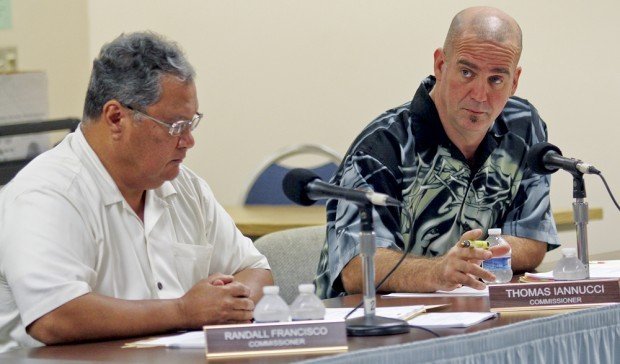LIHU‘E — The Kaua‘i Police Commission meeting Friday concluded with the announcement that the longest-serving commissioner would be stepping down. Thomas Iannucci has served on the commission for seven years. He said the KPD, commission and county now have a
LIHU‘E — The Kaua‘i Police Commission meeting Friday concluded with the announcement that the longest-serving commissioner would be stepping down.
Thomas Iannucci has served on the commission for seven years. He said the KPD, commission and county now have a solid relationship, which was not the case when he began.
Among the many commission accomplishments during his tenure, Iannucci is proud of the expansion from five to seven members, of training for commissioners, and with hiring KPD Chief Darryl Perry, a person he said chose to help his home town over higher salaries elsewhere.
“It is hard to leave after being involved for seven years and I hope to be part of it in some way as the chief of the Civilian Academy or the Chaplaincy,” Iannucci said.
Charles Iona is completing his term as Commission Chairman this month. Vice-chair Ernest Kanekoa Jr. was nominated to serve as chair, and commissioner James O’Connor was nominated for vice-chair, to be confirmed at the Jan. 27 meeting.
Perry in his report announced that Capt. Michael Contrades would be promoted to Assistant Chief effective Dec. 18. Contrades, a 17-year KPD veteran, became the Hanalei District Commander in 2007 and achieved the rank of captain last January.
Perry noted that three officers that have served since 1987 have announced their intentions to retire this year. He anticipates around 10 to 15 new recruits for the cadet class.
“We are working hard to get new people,” Perry said.
The KPD partnership with Kaua‘i Community College is on track, Perry said, and the goal is to have employees and officers have access to the types of training and professional development courses they will need to further their careers.
Liquor and crime
Eric Honma, the Director and Chief Investigator of the Department of Liquor Control, provided an overview of liquor sales, related problems and solutions that the department is developing regarding density of liquor and crime.
Kaua‘i has 205 establishments – about half are on-sale liquor licenses — hotels, restaurants and taverns; and the other half are off-sale licenses such as liquor stores and licensed retail outlets. This number has remained stable for a decade, with slow commercial development and existing licenses transferring to new owners.
Each licensee reports annual gross liquor sales to Liquor Control. For 2010-11 Honma said total island liquor sales was just over $87 million. This translates to $1,298 per person on Kaua‘i, and 326 individuals per licensed establishment, he said, and addit that the numbers demonstrate possible challenges for police and social service agencies.
Honma compared other counties and state averages. He added that vacationing visitors bring up this number and that future analysis will explain how higher-cost establishments could skew the perception of actual consumption.
Statewide liquor sales total $1.47 billion, Honma said.
The on-sale establishments present police with enforcement issues of noise violations, assaults, and related behavioral incidents on the premises. The role of Liquor Control is to issue citations and to suspend or revoke licenses.
The larger problem happens outside of the establishments, said Honma, where intoxicated individuals choose to drive on public roads and present the greatest danger with accidents and fatalities.
Underage drinking
Liquor Control conducts underage compliance checks with an alternating calendar to avoid the perception of selective enforcement. In partnership with the University of Hawai‘i Cancer Center, Liquor Control trains students ages 18 to 20 to accompany undercover officers and chaperones in attempting liquor purchases without deception.
A recent check of 32 establishments over two days resulted in three violations. The goal is 100 percent compliance, said Honma, noting the human factor presents the most frequent trouble with cashier and servers not asking for ID or overlooking other protocol.
Liquor sales require a valid Hawaiian driver’s license or identification card. Since 2006, the state has issued a vertical license to drivers between the ages of 18 and 21.
That should be an automatic red flag to prevent the sale of alcohol, tobacco, or other prohibitive items, Honma added.
Liquor licenses
Liquor Control is now in the process of compiling liquor license locations and violation data regarding on the Geographic Information System. This mapping application is available to county departments.
Honma said he hopes KPD will be able to use the Liquor Control data within its crime statistic software. It is his intention for the GIS to help reveal density concentrations and locations of alcohol related crashes, DUIs and incidents.
The information from this correlation of frequency and density is useful for KPD to plan for allocation of resources to address enforcement challenges in problem areas, Honma said. The county can incorporate the data with zoning decision or when considering permits with regard to questions of density and social impact.
When a liquor license request is opposed by community, Honma said they don’t have the data to support their concerns. He said the GIS would provide that data.


